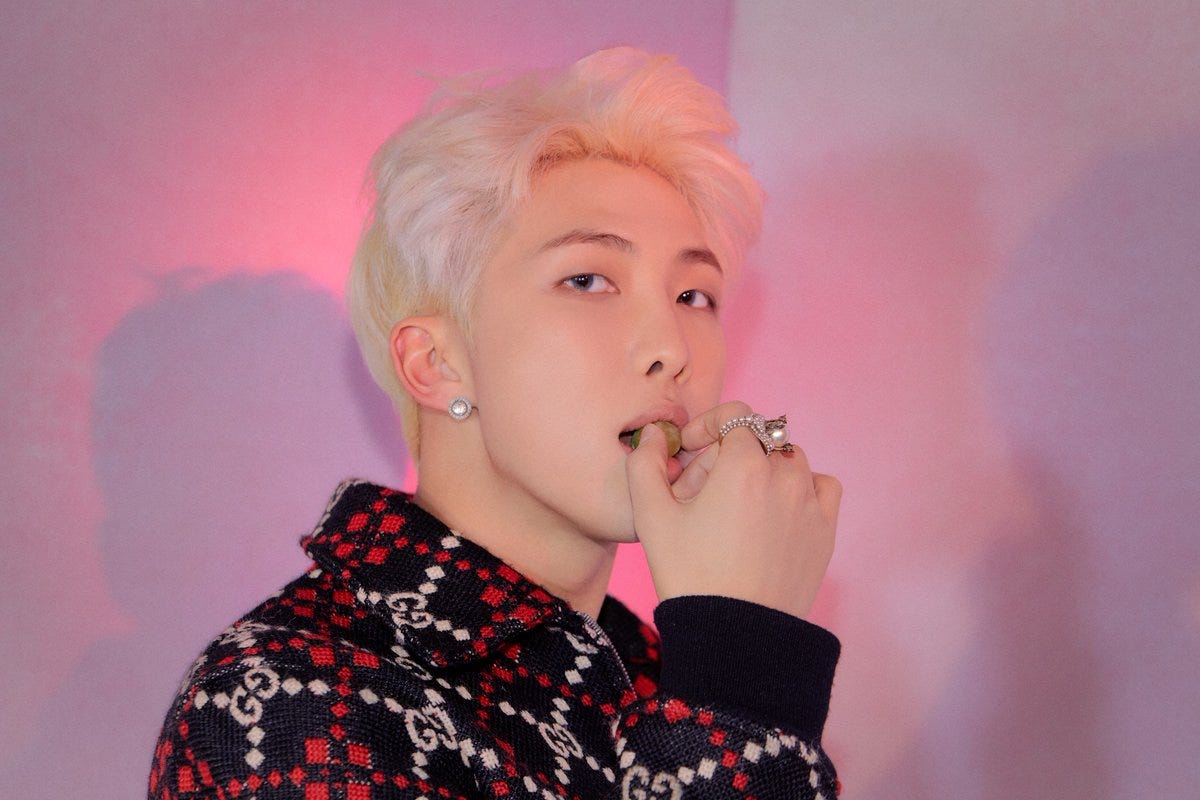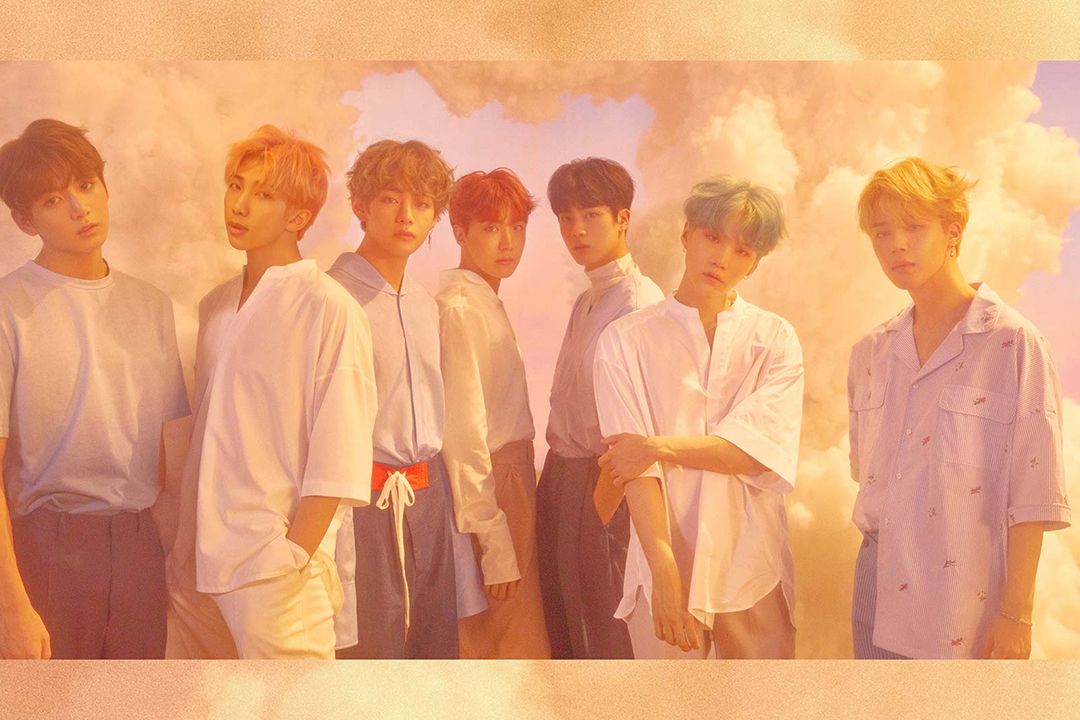“...we constantly unravel our stories through music. There aren’t many K-pop artists who tell their own stories.” Bang Si-hyuk, in a 2017 interview (translation)
In the Western media, the labels attached to BTS of “K-pop,” “boy band,” and “social media phenomenon” are so sticky and have such clear, often derogatory, connotations that the casual viewer can easily forget or dismiss the fact that musical talent and artistry is even involved in their success. I was certainly one of them: when I read about their accomplishments in the news, I just assumed BTS were just particularly handsome and good at social media and in general the object of millions’ of teenage obsessions as the latest boy band du jour post-One Direction, but otherwise I didn’t care to make the effort to learn more about them, whether by listening to one of their songs or watching a music video.
And that’s largely because, to this day, it still takes substantially more effort to learn about BTS in the West than musical acts of a similar level of success and dominance. (In case you think my ignorance is due to some sort of aversion to popular music, I was definitely not clueless about Coldplay, Taylor Swift, Adele or Beyoncé - in fact, I was so aware and invested in their music that I’ve paid to see all of them in concert in the last five years.) BTS isn’t played on the radio very much (although "Dynamite" is changing that slowly but surely), you won’t be recommended their videos on YouTube until you’ve indicated to the algorithm in some way that you’re interested in K-pop or online pop culture, and oh, once you get some sort of exposure to their music - you still have to figure out what they’re singing or saying by putting on subtitles or searching for good translations.
“K-pop,” with its hyper-polished performance values and trainee “factory” model, definitely does not appeal to the average Western person’s image of a passionate young musician waiting for his big break (e.g., Justin Bieber being discovered on YouTube). The “boy band” moniker, with the recent lineage of the Backstreet Boys, *NSYNC, and One Direction, has really been stripped of any sense of artistry or talent as these groups were so clearly commercially-minded entities. The man on the street does not associate acts like The Beatles, or the Jackson Five, with the term “boy band” and yet, strictly speaking, they were boy bands. And “social media phenomenon” is either associated with someone like Kim Kardashian West (famous for being famous) or the latest boy wonder on one of those social media platforms (Snapchat & TikTok) that adults just don’t seem to get.
In 2020 it’s interesting that a group with as much commercial success as BTS is still considered niche, and while we’ve now as a society finally started to approach the de-normalization of ignorance (especially as it relates to BIPOC talent) and ARMY is of course fully entitled to call out mainstream publications for their continued ignorance in coverage of BTS (the latest fiasco being TIME’s special edition on BTS and a few racist comments after their latest UN speech), it’s a situation that is, in many ways and unfortunately, predictable given the labels that BTS carry.
So let’s talk about BTS's talent as musicians and artists and how they radiate joy, comfort, and delight through their music and performances.
Music: “The genre is BTS”?
If you missed the K-pop 101 section, let me give you a quick recap on the music front: K-pop aims to sound just like mainstream global popular music, but sung in Korean and with enough English to help international audiences understand the gist of the song. As Noah Yoo, a music writer, put it after attending a BTS concert in Pitchfork: “This is the state of modern K-pop: an ever-evolving reinterpretation of Western rap, R&B, and electronica through the lens of the Korean experience.”
Popular music is really not a musical genre, but rather a category of commercially successful music. Popular tastes have changed over the years, but in the last decade hip hop, EDM (electronic dance music aka techno) and R&B have reigned supreme.


BTS’s musical roots lie in hip-hop, as the group was originally formed around a hip-hop concept featuring RM and Suga who were well-known in the underground rap scene as teenagers. Youngdae Kim, a Korean music critic, in his analysis "How BTS Succeeded Where Other Boy Bands Couldn't" explains: “BTS's music comes across as organic because it is a natural output of the members’ own minds. It is not a coincidence that BTS began their musical journey with hip-hop, the genre that perhaps has the highest bar for authenticity.”
When BTS was re-imagined as a K-pop idol group, their first few albums still retained a hip-hop core. However, starting with The Most Beautiful Moment in Life series that began in 2015, they started to experiment with other popular genres and have continued to evolve and experiment with their sound with each release. Their main musical mentors, Big Hit founder Bang Si-hyuk and producer Pdogg, have discussed how they pay very close attention to global popular music trends on streaming platforms like YouTube, and when Bang appeared on the Korean lecture series “Good Insight” to explain BTS’s success, they showed footage of him with Pdogg in LA buying stacks of vinyl records of genres they wanted to study up on.
As this video created by a fan shows, BTS has released a number of songs in a wide range of popular musical genres:

Suga notes that he and the group wholeheartedly embrace and pursue popular appeal in their musical style:
“This might sound a little too pragmatic, but we make pop music, don’t we? I think that I consider popularity as the most important. It’s obvious that we put in certain elements for popularity, especially in the title track.”
K-pop is often written as a global collaboration with Western songwriters, and BTS is no exception. When they work with foreign songwriters, the group's A&R representatives provide a very clear brief on the intention behind the song. Ashton Foster, a songwriter who worked on Jimin's solo "Serendipity," spoke to Billboard about the process: “They gave us, as they do a lot of times, a very deep, meaningful paragraph when they sent the track over about what the track is all about. I remember it was quite in-depth, even about the word itself. The concept was already there.” Songwriter Charlie J. Perry, who worked on V’s solo “Singularity” noted a similar starting point: “They gave me this amazing brief, kind of, of what they wanted. It was like a poem. They sent me a poem of what they wanted it to feel like, almost. Incredible.”
Roman Campolo, a songwriter who has worked with the group told Rolling Stone, “[BTS] are an amalgamation of everything that’s happening in American pop music, and they bring equal amounts of enthusiasm to it all.” Another songwriter, Irish singer-songwriter Orla Gartland, who worked on the melody of “134340” notes that “they’re trying more than pop [acts] usually try – it’s quite ambitious musically.”
As a Taylor Swift fan, I never consciously registered her extensive use of one-note melodies (try humming "Blank Space" to yourself) until it was pointed out to me in this analysis in comparison to BTS by Alapadma, an ethnomusicology student who blogs about music, culture and BTS. She notes that the major difference between what we hear in popular Western music and BTS songs is the “melodic complexity and variability” that is quite common in most popular music in Asia.
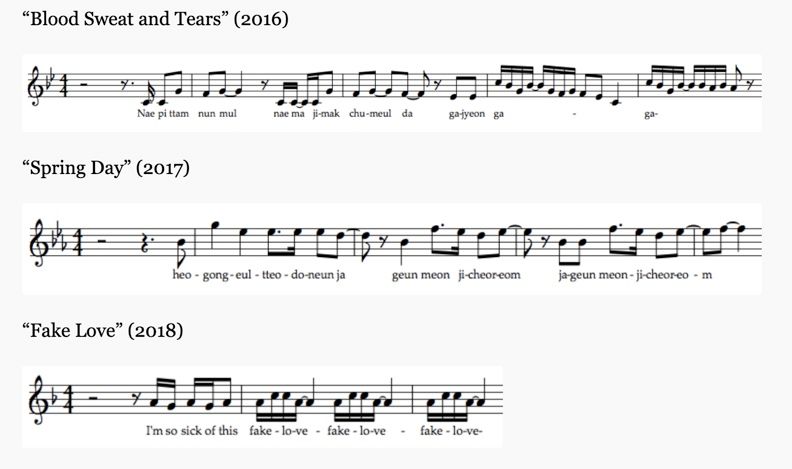
The major singles released in 2020 have had a wide range of musical genres and sound completely different yet distinctly “BTS.” “Black Swan” is emo-rap set against a heavy trap beat. “ON,” the lead single off Map of the Soul: 7, extensively incorporates an American marching band. And finally, their latest digital single, “Dynamite,” is disco-pop that throws back to the 80s and Michael Jackson. So maybe the guys are right - their constant experimentation in popular genres has become their hallmark and the genre is BTS.
“The genre is BTS. That’s the genre we want to make and the music that we want. New genre.” Jungkook, V and J-Hope in a 2020 interview with Grammy.com

A fan created this handy guide to the BTS discography if you want to explore their music by genres (with links to the corresponding Spotify playlists):
- Red: Soft Ballads
- Yellow: EDM
- Orange: Catchy Pop
- Green: R&B / Soul
- Blue: Hip Hop / Rock
- Purple: Rap / Trap
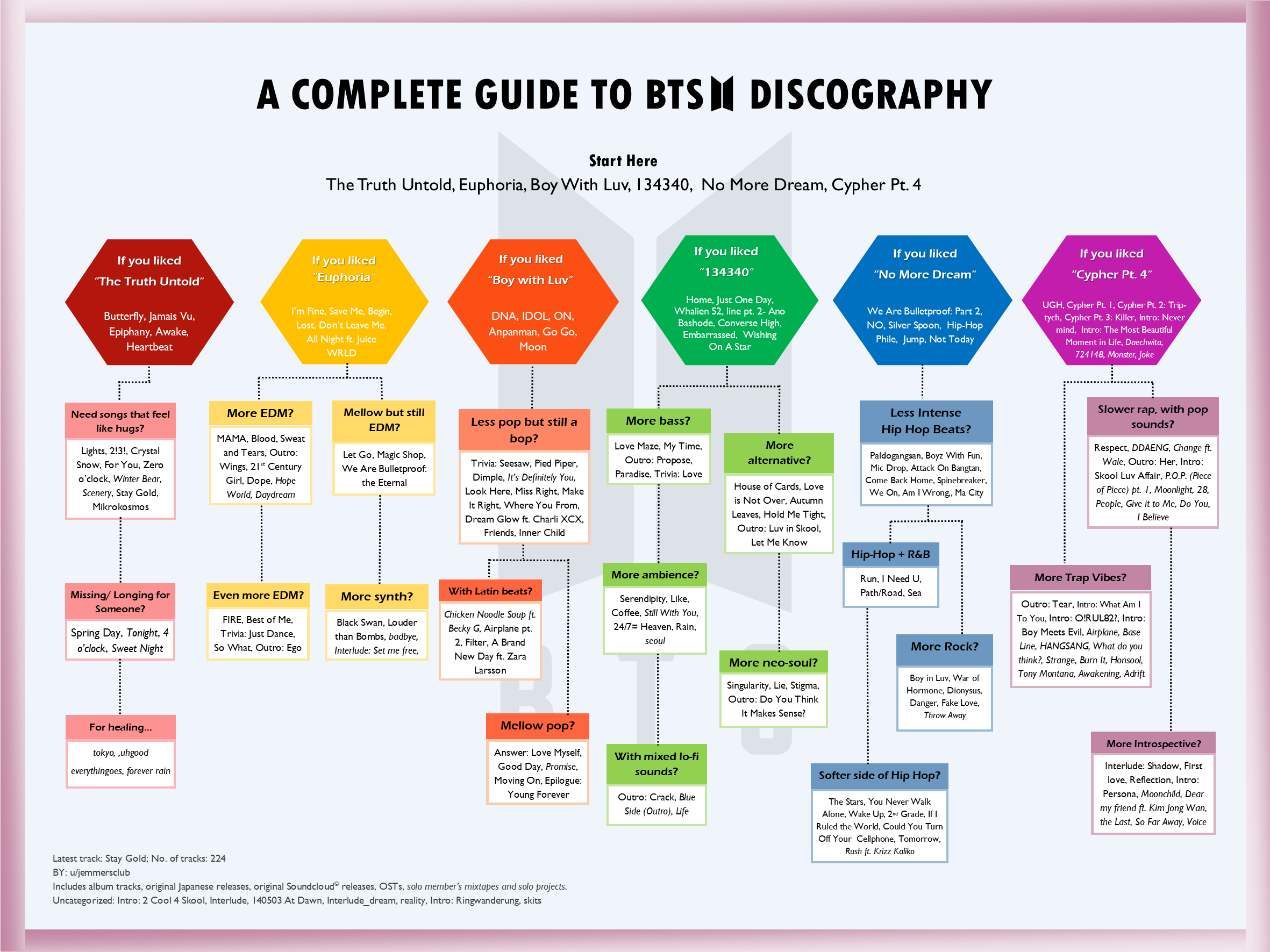
Lyrics: The Narrative Arc
“By the lyrics, I wanted to tell people ‘I am anxious, so are you, so let’s find the way and study the way together.’” Suga of BTS in a 2018 interview (translation)
Sincerity and relatability are the two characteristics that come through loud and clear in BTS’s lyrics. The group has been exceedingly candid in their lyrics about the challenges and struggles they have experienced at every stage of their own growth and career, initially as young people growing up in a hyper-conformist Korean society, then the struggles they experienced with self-identity and self-love, and more recently their acceptance of their persona, shadow and ego in context of their artistic ambitions and fame. Their producer Pdogg explains, “The members themselves write about 90% of the lyrics… they don’t tell stories that they don’t know or didn’t experience themselves.”
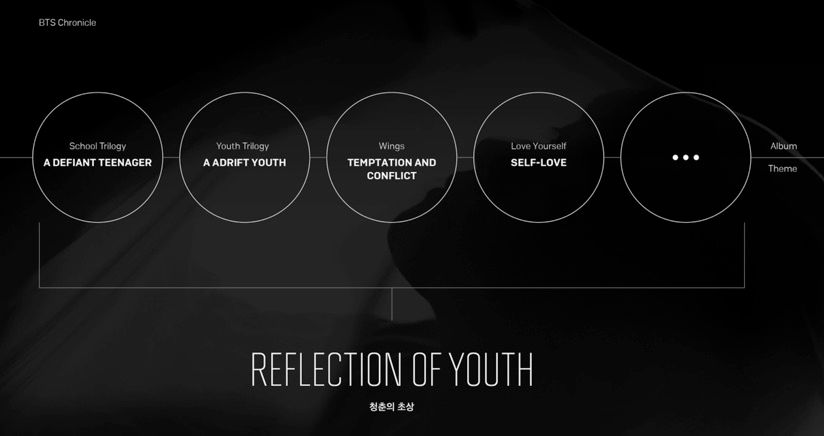
An article that analyzes how BTS is different from K-pop explains it like this:
“There is no denying that they are from the K-pop industry—the way they go about creating music, distributing it, performing it is all rooted in the K-pop framework. Their music is also undeniably influenced by this system; for example, their title tracks must have some element of performance that is compatible with choreography to satisfy the sonic and performative needs of K-pop. But the main difference between BTS and K-pop, and the main reason they shouldn’t be categorized as K-pop, lies in the essence and purpose of their musical content.”
When I started to learn more about BTS, I was struck by how many fans on Twitter shared how deeply BTS lyrics had resonated with them, even though most of them could not directly understand the group’s primarily Korean lyrics, and that listening and following along to the lyrics helped them feel less alone in their own struggles.
I was recently asked by a friend which happy BTS songs I would recommend, and I was initially stumped. There are definitely up-tempo, fast-paced and catchy songs, but not too many are truly “happy” and cheery at its core both musically and lyrically. In a 2017 interview, Bang shared his opinion that “present idol singers' music focus too much on "having fun." BTS went in the opposite direction. They focused on singing about the brutal realities and the concerns experienced by the youths of this generation rather than happy music.”
RM is their main lyricist and one of my favourite BTS English translators, Colin, explains the resonance of his work:
“What makes him special is not only his ability to compose songs that are imagerial poems created specifically to amplify the listeners’ senses and that employ complex yet effective symbolisms and nuances to construct lyrical lines with layers of meaning that can be interpreted in a myriad ways, but also his ability to articulate the sensibilities of the current generation to connect with and speak to his listeners on a personal level.”
Concepts are not a new part of the K-pop playbook, but the commitment and depth of emotional sincerity is. Billboard columnist Jeff Benjamin notes that:
"I've seen K-pop concepts that have ranged from Greek mythology to exotic animals to religious characters to Nick Cannon movies, but I don't think I can recall a popular K-pop act discussing themes of psychology and philosophy in their lyrics. And if they did, it wasn't a band at a level anywhere near BTS or they weren't as explicit as the group is on Map of the Soul."
Performance Art
“When a group makes a comeback, they are not thinking about just the music when they select a song – they are thinking about the choreography, the stage outfits, camera angles that will be used, the overall visual concept, the different ways that the members will wear their hair, and the list goes on and on. Groups don’t pick songs based purely on the music. They pick songs based on their performance potential.” Hannah Waitt, K-pop journalist, in her history of K-pop series
As touring has become the financial lifeblood of the music industry in the last two decades, it’s interesting that performance skills are not as emphasized when evaluating Western artists as it is for K-pop idol groups. It seems like many Western concert-goers primarily value having a good time at a show through components like cool stage design, pyrotechnics and other visual effects, and dance crews over the charisma and talent of the artist’s live performance. As a regular concert-goer, I’m more often than not surprised and then delighted when I find that the live performance is excellent because that’s not my default assumption going in. (Standouts in my memory are Shakira and Beyoncé. One Direction was, as expected, quite awful as live performers. I had gone to their 2015 tour on a lark given their tickets had been so heavily discounted that they had shown up on Groupon.)
Alapadma, an ethnomusicology student who blogs about music, culture and BTS, helped me understand why Western pop music underwent a shift away from performance largely due to the shift to streaming:
“Every genre of music is tailored to support the system it comes from. Western pop music, for example, used to be highly performance-based with long instrumental interludes and flamboyant choreography. This was necessary because Western popular music used to be transmitted primarily through live shows—music festivals and concerts were career-changing events necessary for any artist wishing to share their music with others. Today, the system for Western pop has changed dramatically, and so has its music; digital streaming has taken the emphasis away from performance quality and put it into sound. Sonic experimentation and vocal performances, combined with shorter tracks (to maximize streaming numbers) are the main characteristics of today’s Western pop.”
As Big Hit’s Performance Director, Son Sungdeuk, explained in a 2015 interview:
“Every time I plan choreography, my style is that I always express the lyrics through the dance, but with BTS, there is also a lot of rap (in their songs). Therefore, if they just dance separately, the dance will be separate, the song will be separate (T/N: he means no harmony of dance and music). I want to create a stage (performance) where you can see and hear the same story. I would like it if the audience/fans looked at why BTS shows these expressions, why they did (chose) these movements."

There’s not only supreme attention lavished on the dance and choreography side of performance, BTS fans eagerly anticipate the visual side of every “comeback” and performance cycle as they’ve come to expect entirely new stylistic choices to match the concepts of the music. (Besides the outfits, a major source of speculation is the members' hair colours.)
Big Hit and BTS work with a number of creative partners to bring their narrative vision to life. One of the group's most long-standing and fruitful creative partnerships has been with the video production agency Lumpens, lead by creative and video director Yong Seok Choi, who has been responsible for many of the group's most influential music videos.

It might be too early for you in your journey into the BTS rabbit hole to watch, in full, their nearly 40 min (mostly) live performance at the 2019 Melon Music Awards, one of the end-of-year K-pop awards shows (akin to something like a Billboard Music Awards or American Music Awards in the US but way more involved, performance-wise). But even if you just skim and skip around, I think this performance, a romp through a few of their biggest hits over the years, bookended by the first and title tracks of their EP Map of the Soul: Persona, is such a clear showcase of what powerful performers BTS have become over the years. They nail their intricate and strenuous choreography while singing and rapping live with stability and power. (That alone is of course incredibly impressive.) The cherry on top is their charisma, flair, or “swag” - the little gestures, the cheeky and intense gazes at the camera, the sheer joy of performance they convey - which make them the compelling performers they’ve become over time.
Their early performances - while technically impressive - did not have this same emotional resonance. Their little brother group within the same entertainment company, Tomorrow X Together or TXT, performed at the same awards show and while very successful as rookies in their own right, especially with Big Hit’s now mature supporting ecosystem compared to BTS's early days, it’s clear they still need time to hit their stride as performers.
A couple of highlights to call out in this performance:
4:58: Note that V seems to be deliberately not singing the end of his first few lines in their first group performance of “Boy in Luv” to show that they’re singing live and not lip-syncing. (Of course, it could also just be a stylistic choice for this performance because he does the same thing when the verse repeats. It’s also fun to compare and contrast this performance of “Boy in Luv” in 2019 with their Korean music show performance of the same song five years earlier.)
19:56: Their individual showcases begin, starting with V
22:22: Jimin showcasing his roots in contemporary dance
34:12: If you only watch one section, make sure you catch this Dionysus dance break

Extra Credit: Your Study Guide to BTS's Music, Lyrics, and Performances
Music
BTS have been ridiculously prolific in their 7+ years and this resource catalogues every single record they've released:
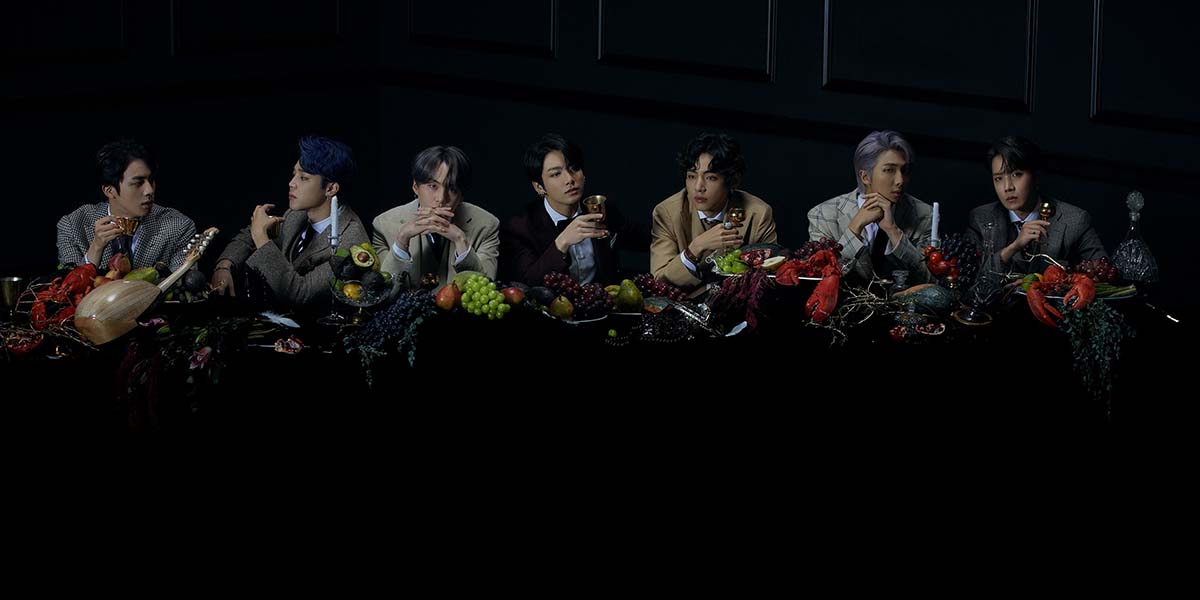
It’s a little out of date (published April 2019, before the Map of the Soul album series began) but a great guide nevertheless to the BTS back catalogue by the blogger behind Ask a Korean and the author of BTS The Review: a Comprehensive Look at the Music of BTS:
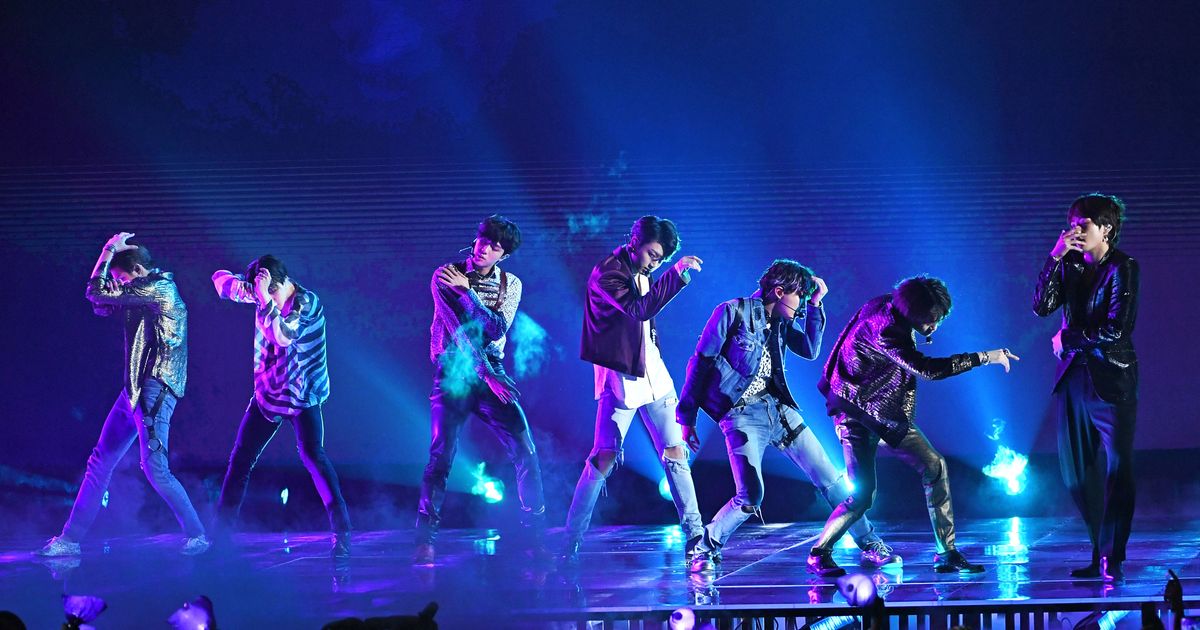
If you have an hour to spare and would appreciate some hand-holding through BTS music appreciation class, Lenika Cruz, a senior editor at The Atlantic and a vocal BTS fan amongst Western journalists, has written an extensive companion guide to their latest album that contextualizes and analyses its music, lyrics, and production:
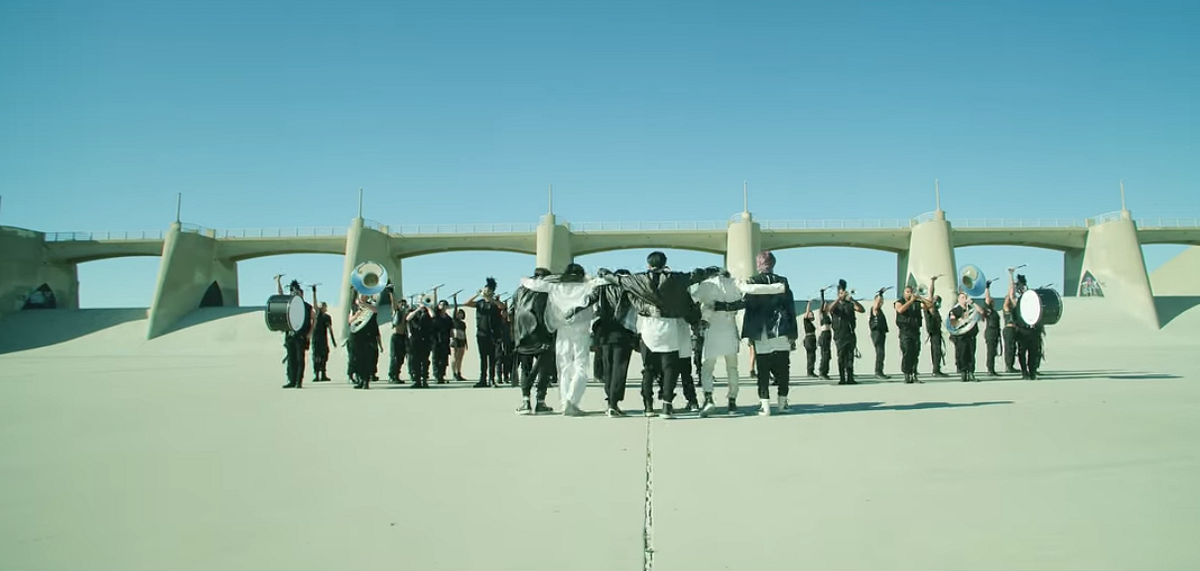
A look at how Western music journalists are prejudiced against viewing BTS's music as art, and why that perspective is misguided:

If you’re a David Bowie or Beatles fan, the same author wrote a comparative analysis of BTS and these iconic artists’ messaging:
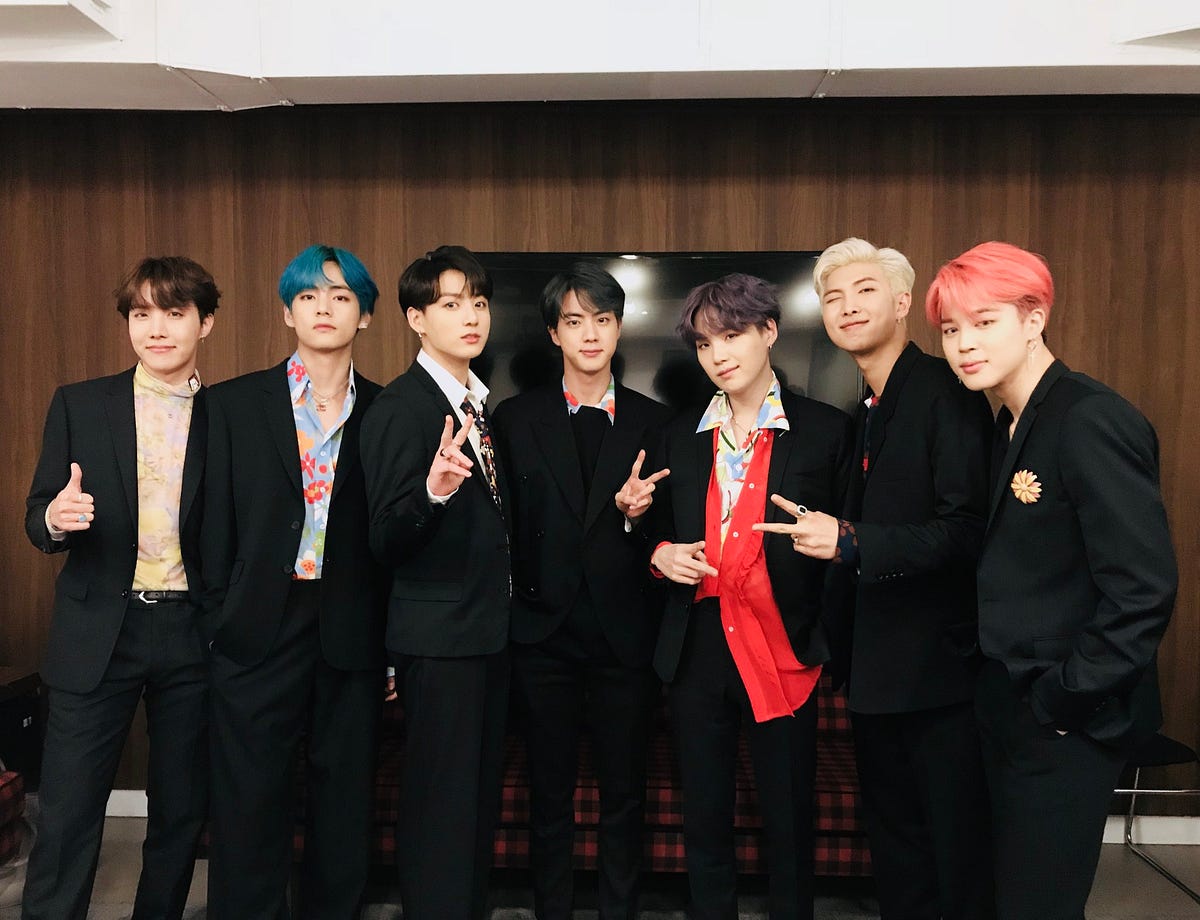
Interviews with Western songwriters and their experience collaborating with BTS:

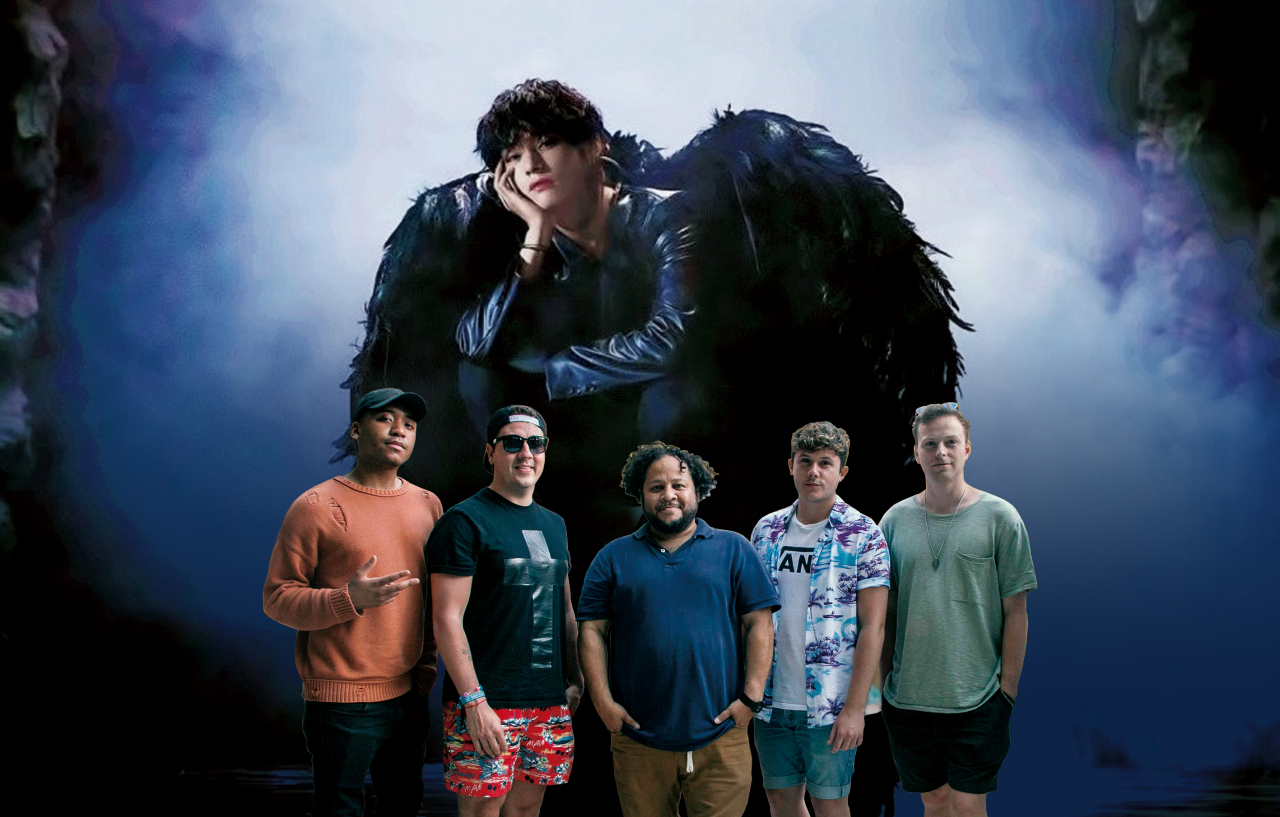
Performance
If you’d like to understand more about the importance of these end-of-year awards shows in the K-pop calendar and would like to see more examples and analysis of BTS's iconic performances, this is a wonderful guide by Dr. Balmain, who is a film academic and the committee chair for the Global Interdisciplinary Conference Project on BTS that was held in January 2020:

While Big Hit Performance Director Son Sungdeuk gets most of the credit for orchestrating BTS's performances, he works with a number of global collaborators to develop the group's iconic dance moments:

Thanks to @modooborahae, we have translations of insightful profiles with the key mentors and professionals guiding BTS as musicians and performers: Big Hit founder, Bang Si-hyuk; their producers Slow Rabbit, Pdogg, and Supreme Boi; their performance director Son Sungdeuk; and their stage producer Kim Sangwook:
TopClass Chosun released its June edition of all things @BTS_twt. Here’s a translation about Slow Rabbit, a Big Hit producer.
— ˗ˏˋbora⁷ˎˊ˗ (@modooborahae) May 27, 2019
(I want him to drop the Jungkook guide version of “I Like It”) #BTS #방탄소년단
🔗 https://t.co/7XPf6V5e79 pic.twitter.com/EUvg7AjNcA
Great English Translations of BTS Lyrics (you can do better than Genius!)


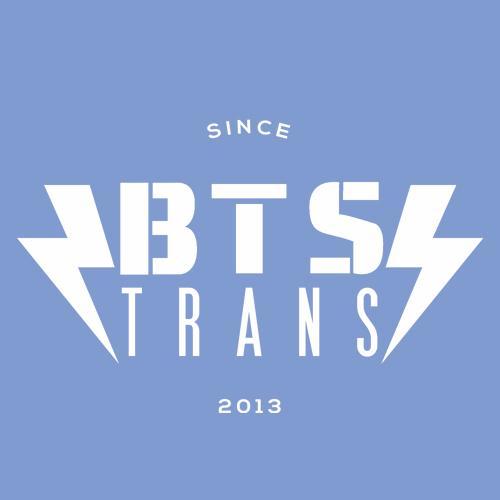
My absolute favourite translations come from Colin, a Korean professor who specializes in translating English history books into Korean. On his Twitter account, he prefaces the translation of each song with an informative essay that provides valuable etymological and societal context for its key lyrical features. I had a rough idea of the lyrical content of each song thanks to a combination of lyric videos and Big Hit’s subtitles in music videos, but his translations and explanations have given me an entirely new level of appreciation of the beauty, care, and skill that goes into the lyrics of each BTS song. (They have also given me a renewed, intense sense of FOMO for not understanding Korean.) If a member of ARMY is reading this who just so happens to be great at making websites and/or editing video (and I know there are a lot of you)… can I please ask you to reach out to Colin to help make his content more accessible and searchable? Instead of making yet another hilarious compilation (which I definitely appreciate, but do we really need the ten thousandth “BTS being chaotic” video?), let’s help I-ARMY learn more about the artistry behind BTS's lyrics:
BTS @BTS_twt Song Lyrics Translation Thread
— Colin (@ColinSH3) November 7, 2019
To make my translations more accessible, I made this thread to pin and upload previous works and future ones piecemeal here. Those who want to use my work, you need not ask for my permission. Spread BTS’ beautiful lyrics far and wide. pic.twitter.com/tuh0BANObR
Teamwork makes the dream work
“I think that the main point of an idol team is their harmony. The team has to do well for the individuals to do well. It’s not easy for seven people to think that way, but I think it is our strength that we do think this way.” Suga of BTS in a 2017 interview (translation)
BTS releases an enormous amount of output, whether it be official music releases, performances, or reality behind-the-scenes content. What’s remarkable throughout all of the content is how clear it is that they like and respect each other. Given the volume of time they spend together on camera, it’s a quality that would be really hard to fake and thus another example of how they convey authenticity to their fans.
In the 2020 docuseries, Break the Silence (Episode 2), Suga explains how unusual the situation within K-pop groups are because: "... an idol group is a rare social construct. Complete strangers live together and have to get along well." In episode 6 of the same series, Jimin and Jungkook comment that they now understand why “many people envy us” in the K-pop industry because “a lot of them don’t get along.”
I’ll get more into their content strategy later, but I wanted to share this passage from an MTV.com primer on their self-produced variety show, Run BTS!, to illustrate how teamwork is omnipresent in their content:
“A huge part of the appeal of BTS, and what takes you from being a casual listener to a fully-fledged member of their ARMY is the joy they seem to take in each other. It's the way they all have their own quirks and strengths as individuals and entertainers but also come together as seven to form something remarkable. Run BTS highlights this teamwork while reinforcing the fact that no matter how many global records they break, millions they earn, or award shows they attend, the members are still a bunch of humble dorks who break things, make fools of themselves, laugh at their own terrible jokes, and throw each other under the bus for the grand prize of instant noodles. It's a reminder that at the end of all this, they still love one another a lot.”
BTS’s teamwork plays a huge role in enhancing their appeal as entertainers, but also in their ability to continue to pursue excellence in their artistic endeavors and have unusual longevity in an industry known for burnout.
Fans eagerly anticipate non-music-related releases, such as their variety shows or interactive content like livestreams, because it’s great fun to see them interact with each other. Their teamwork is both endearing and authentic. As gossip blogger Lainey puts it,
“None of this matters though if the chemistry isn’t there. One of the reasons I’ve become so into BTS is because well, I really do love the music, but also because their personalities are so distinct and compatible, their relationships with each other so real and tangible”
In the K-pop industry, the life of an idol group is notoriously short given the grueling promotional pace and intense competition for attention. BTS have stayed together for over seven years now and fans can see through their ubiquitous content how sincere they are in their pursuit of constant improvement.
RM, in their 7th birthday party video, explained why they’ve stayed together for 7 years:
“I believe a team is better than one. We all want to do different things and our goals are different too. But instead of doing things alone I held back what I wanted to do a bit to do things as a team. I believe we create something better when we are together as a team and with our fans. That belief keeps us going. Otherwise someone could have left the team because you are exhausted or for whatever reason. Instead of thinking I can do better alone I believe doing something as a team would lead to a much more meaningful life for me.”
This is a particularly poignant sentiment given that it really was RM’s choice to go with BTS (rather than solo) that catalyzed this whole journey.
They’ve done docuseries behind all their tours, and these interviews combined with their annual FESTA content show BTS at their most reflective. They are open with the price of fame, the toll the gruelling schedule and performance demands take on their bodies, the existential questions they ask themselves about their future as performers and artists.
During the most recent annual FESTA birthday party video celebrating the 7th anniversary of their debut, J-Hope mused out loud, “Sometimes I wonder what it was that made ARMY love us?” and “What part of us made ARMY love us?”

They were in a nostalgic mood, and other members talked about how they spent some time recently reviewing their old videos to try to answer that question for themselves given how far they have come since then. They reminisced about just how hard they were working back then, when reviewing content from the early years how palpable that effort was on camera.
Suga commented, that before debut, he wondered, “We’re so different, can this work?”
Then, he concluded: “But now people praise the balance in us. We came to accept each other and from that we get synergy.”
Recommended Reading:
2014 Interview with BTS: Given the volume of content available, especially on video, it might seem a bit strange to recommend a print interview with BTS. But I was really struck when I stumbled upon this interview by how clear and strong their teamwork comes across in this interview very early in their career, before they were launched into their current stratospheric level of fame.
An antidote to toxic masculinity
"The self is a combination of feminine and masculine features, so there is an idea of wholeness expressed in the idea of androgyny, and I think that’s portrayed through the way BTS is dressed, perform, and sing. Most singers are either very masculine or very feminine and they draw on the anima or the animus strongly. If you look at them and respond to their music, they draw on that part of the psyche. BTS doesn’t do that, BTS is more of a wholeness in my view." Dr. Murray Stein, American Jungian analyst and author of “Jung’s Map of the Soul: An Introduction” which has inspired BTS's most recent “Map of the Soul” album series
When Jimmy Fallon asked the band why their fans are attracted to their music, Suga answered: “I think our greatest forte is that we send messages that people in their teens, twenties and thirties can all relate to and give comfort through our music.”
Much of that comfort comes from how open they have been about their own mental health and how that runs counter to both typical K-pop norms and traditional views of masculinity in global culture.
While most K-pop songs are intended and promoted as a form of escapism from real life, many BTS songs address the members’ personal struggles and anxieties.
For example, in a livestream with fans about the production process behind his playlist mono, RM revealed he was inspired to write the song “everythingoes” after a conversation about his mental health with a trusted mentor.

Michelle Cho, an assistant professor of East Asian Studies at the University of Toronto, shares that fans of BTS "self-report… that BTS has really helped them mentally and emotionally come back from difficult challenges or found them at moments where they needed encouragement. Their core message continues to be one of a youthful struggle against an adult world that can feel intimidating, forbidding, and the way that young people can come together to overcome the stresses and challenges of growing up.”
BTS, through the enormous amount of filmed content they’ve shared with fans, also promote a less toxic view of masculinity where men wear makeup, are comfortable with physical displays of affection with each other, and are not afraid to cry on camera or in front of their fans. Some of this is cultural to BTS as Koreans, with “skinship” or same-sex physical displays of affection such as hugging and touching seen as normal between friends and not indicative of romantic affection, as well as the widespread acceptance of men wearing a light amount of makeup in society.

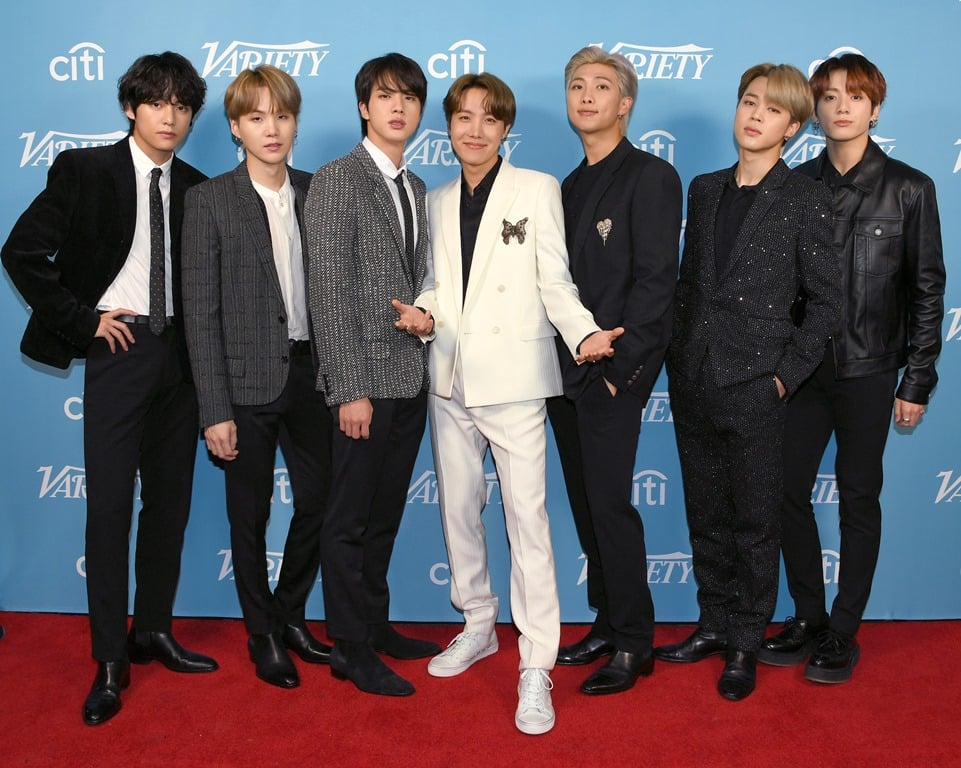

Some of the most affecting and intimate footage that BTS releases comes their docuseries and documentary films where they go behind the scenes of their global tours. They’re open in showing the difficult times they have and the toll that their choice of career has on their physical and mental health:

Through their music, interaction with each other, the media and their fans, BTS has been available to convey a message of comfort for their fans. In an interview with TIME Magazine, the group’s creator explains, “I fundamentally believe BTS's success in the U.S. had a lot to do with luck. It wasn’t my brilliant strategy or BTS being such a perfect fit for the U.S. market. It was rather that their message resonated with a certain demand, and through digital media, it spread quickly. And BTS touched something that wasn’t being addressed in the U.S. at the time, so American youths reacted, and that was proven through numbers.”
seokjin's comforting and inspiring words; a thread pic.twitter.com/D692o8am5x
— ri (@jinrkive) August 20, 2020
Their ability to share and normalize conversations around mental illnesses is beautifully illustrated in this video:
"Their affection with one another, their vulnerability and emotional openness in their lives and in their lyrics, strikes me as more grown-up and masculine than all the frantic and perpetual box-checking and tone-policing that American boys force themselves and their peers to do. It looks like the future." Dave Holmes in the Esquire Winter 2020 cover story, "The Boundless Optimism of BTS"
Recommended Listening and Reading:

